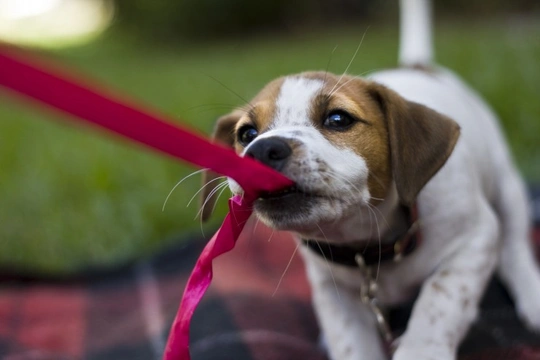
Training the Jack Russell puppy
The Jack Russell is one of the most ubiquitous dog breeds in the UK, and is still by far the most popular small breed of all. Jack Russells can vary considerably from dog to dog when it comes to their appearance, coming in various different heights, builds, colours and coat types, but even so, dogs of the breed have a lot more in common than they do apart!
Confident, plucky, lively and entertaining, the Jack Russell is a very versatile breed, and while today they are mainly bought as pets, you can also see representatives of the Jack Russell breed taking part in virtually every form of canine sport, as well as certain working roles such as ratting and hunting.
If you have decided that a Jack Russell is the right dog for you and you have your heart set on buying a puppy of the breed, having a plan for how you intend to train and manage them is vital, and this is something that you should establish before you even bring your new pup home.
In this article, we will look at some of the considerations to bear in mind when training and managing the Jack Russell puppy, and share some tips and tricks for achieving your goals. Read on to learn more.
The Jack Russell personality
Jack Russells may be smaller than most dogs, but they pack a lot of personality into those little frames, and tend to be very confident, outgoing and rarely prone to nervousness or fear. This makes exposing them to new experiences and introducing them to new things relatively simple, as they tend to approach new challenges boldly and happily, but this can also mean that your little pup will be quite a handful!
The Jack Russell is not really a good pick for the first time dog owner who has not spent a significant amount of time and effort learning about the breed, because they require careful supervision, training and management from the get-go, in order to ensure that your cute little pup does not grow up into a little terror!
Breed intelligence
Jack Russells are a smart, tenacious breed that tends to learn quickly when being trained, but that also have a tendency to get bored easily. Jack Russells also pick up a lot of things through observation and trying things out, and while this can make training easier in some respects, it also means that it is fairly east for the dog to pick up bad habits, or to teach them something that you never really intended to!
Training the Jack Russell should be something that begins from when you very first bring the dog home, by putting firm ground rules into place and starting as you mean to go on. It is a major error to let the puppy Jack Russell get away with things that you would not permit from an adult dog, and this can make it much harder to correct things later on!
Strengths and weaknesses
The core strengths of the Jack Russell breed include intelligence, tenacity and confidence, all of which combine to make the Jack Russell one of the most versatile of breeds when properly trained and managed.
However, all of these traits have negative sides too, including sometimes being “too smart for their own good” which can manifest as a tendency to seek out trouble and get into hot water if unsupervised, as well as selective deafness or wilful disobedience, and being too confident to the point of dominance in some situations.
It is vital to work with the breed’s strengths and channel their strong points into useful applications, rather than fighting to turn your dog into something that they are not.
Proper training, management and ground rules will allow you to enhance and build upon your dog’s strengths from the time that they are young, and avoid potential problems down the line.
Curbing dominance
As a confident and plucky breed, a poorly trained Jack Russell or one that is managed erratically will often have a tendency to dominance, which can manifest in a variety of undesirable ways.
While small, Jack Russells often manage to wangle their way into the alpha role and become the de facto head of the pack that encompasses you and your family, and this can of course lead to problems that may manifest as snappiness and other behavioural issues.
It is important to incorporate some pack hierarchy exercises into your pup’s day to day life to reinforce their proper position in the pack and keep them in line, such as ensuring that they do not take the best seats, allow you to go through doors first, and wait to be fed after the family.
Socialisation
Jack Russells are rarely wary of or put off by being around larger dogs, and they will often give even the largest of hounds a run for their money! Socialisation from a young age is very important for the Jack Russell in particular, as they need to learn from being around other dogs and find the limits of their behaviour parameters before they begin to get older and see themselves as the dominant dog in a mixed group.
Take every opportunity to socialise your dog with other dogs and people, and nip any problems such as dominance or inappropriate behaviour in the bud early on.



